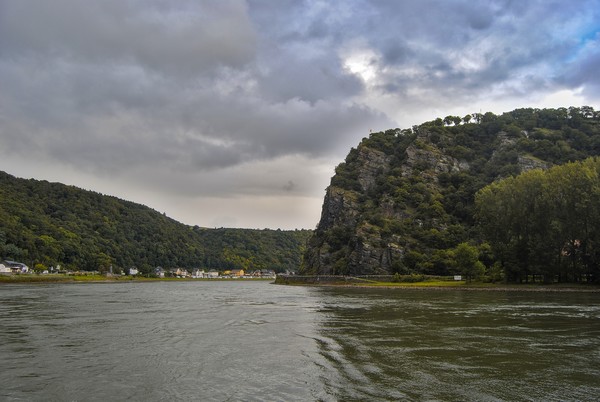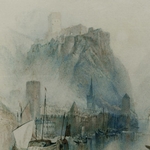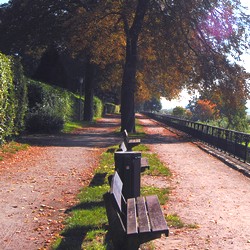
Viewed from the Rhine, the vertical cliff of the Lorelei is imposing. At this point, the river is narrow, and the depth is very variable. Fog isn't unusual, as rockfalls. Everything suggests that, centuries ago, it was a dangerous place for navigation; no wonder that an ancient legend talks of an undine that lures sailors to shipwreck, like the sirens that the smart Odysseus avoids.
Yes and no. The flow was dangerous (modern technology resolved that), but no ancient legend about it has been documented. The Lorelei legend is new, only two hundred years old, and its author is well known: Heinrich Heine.
It all began in the late summer of 1800, when Clemens Brentano wrote one of his first works, Godwi oder Das steinerne Bild der Mutter [Godwi or the Stone Image of the Mother]. The work included a ballad that started this way: “Zu Bacharach am Rhein wohnt' eine Zauberin” [Near Bacharach on the Rhine lived a witch.] The beautiful eyes of the witch enchant men and ruins them. When they bring her before the bishop to be judged, she asks to be burned at the stake: she would rather not live because the only man she loves has fled. The bishop admits he should condemn her, but also admits that he begins to feel the power of her gaze, and orders her to retire to a convent (since her powers doesn't affect women). Lore Lay, that's the girl's name, accepts. In her way to the monastery, led by three knights, she asks them to contemplate the river for the last time. From the top of the cliff, she sees a sailor on a boat; she believes he is the man she loves, and jumps down. Of course, the three knights follow her in their destiny.
This story that Brentano invented from the name of the cliff, Lurlei, inspired many versions; the most famous was written by Heine in 1823. The initial and final stanzas, in the first person, tell us about an ancient tale that upsets the unknown narrator; the four central stanzas tell us the tale: a young woman sits on the rock and sings; lured by her song, sailors forget to pay attention and shipwreck on the rocky coast.
The poem was published in 1827 in the Buch der Lieder, it's the second poem in the second part, Die Heimkehr. Among the many songs written from this poem, this week we're listening to the one I proposed to when I presented the series on this collection by Heine, that of Clara Schumann, composed in 1843; the performers will be Christopher Maltman and Graham Johnson.
The accompaniment of the song catches soon our attention, it warns us of danger long before the voice does it because the poem only mentioned it at the penultimate stanza. When the sailor gets bewitched by the woman's singing, and realizes he has no hope, we hear his horror on the vocal line, while on the piano we hear both the accelerated beat of his heart and the whirlpool that will engulf him. There's still a second climax in the song, the two final verses, when we hear the narrator in the first person again. His fright when he realizes that Lorelei provoked the sailor's death is not far from that of the victim.
Heine's poem spread and internalized so fast that it was soon taken for granted that it told an ancient legend, when, actually, it was created by the joint inventiveness of two poets, Heine and Brentano. As there are Lieder that attain the status of traditional song, there are poems that attain the status of ancient legend.
Ich weiß nicht, was soll es bedeuten,
Daß ich so traurig bin;
Ein Märchen aus alten Zeiten,
Das kommt mir nicht aus dem Sinn.
Die Luft ist kühl und es dunkelt,
Und ruhig fließt der Rhein;
Der Gipfel des Berges funkelt
Im Abendsonnenschein.
Die schönste Jungfrau sitzet
Dort oben wunderbar,
Ihr gold’nes Geschmeide blitzet,
Sie kämmt ihr gold’nes Haar.
Sie kämmt es mit gold’nem Kamme
Und singt ein Lied dabei;
Das hat eine wundersame,
Gewaltige Melodei.
Den Schiffer im kleinen Schiffe
Ergreift es mit wildem Weh;
Er schaut nicht die Felsenriffe,
Er schaut nur hinauf in die Höh’.
Ich glaube, die Wellen verschlingen
Am Ende Schiffer und Kahn;
Und das hat mit ihrem Singen
Die Lorelei getan.


 We were taug...
We were taug...













Comments powered by CComment